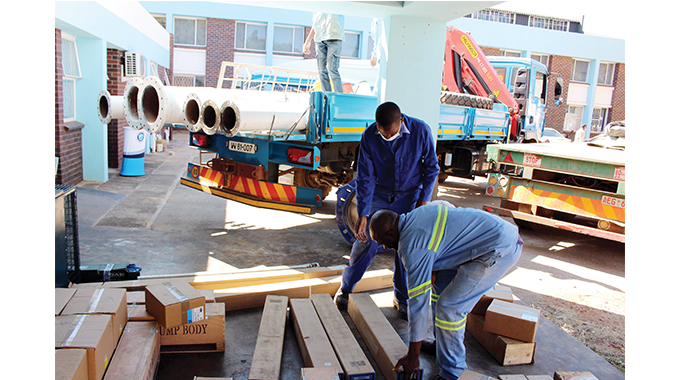Homeless troop back to CBD

Mashudu Netsianda, Senior Reporter
HOMELESS people in Bulawayo, who disappeared soon after the announcement of the total national lockdown on March 30, are back on the streets capitalising on the Government’s decision to downgrade to level two the Covid-19 lockdown.
The partial lockdown has resulted in a slight return to normal day-to-day life in the city’s central business district (CBD).
Vagrants who normally survive on handouts, garbage scraping and foraging for food in the dustbins are taking advantage of a steady increase in the volume of human traffic in the CBD.
A Chronicle news crew yesterday took to the streets of Bulawayo and observed that homeless people who are vulnerable to contracting Covid-19 due to the squalid and unhealthy living conditions, have started flooding the streets. Most of them sleep on shop verandahs, pavements and in street alleys.
Mr Bernard Kariyesu who had relocated to Centenary Park together with his wife, Ms Grace Moyo soon after the total lockdown, are among the group of the homeless people who have trooped back to the CBD.
“I am back in the CBD because it was cold out there given that there is no one who will give you food unlike here where you can ask for money and food from well-wishers,” he said.
Mr Kariyesu said he was aware of the risks associated with street life, particularly in the wake of Covid-19, but he was forced by the situation to soldier on.
“Life in the streets is not ideal especially in light of the coronavirus, but we don’t have anywhere to go and some of us were forced by circumstances to resort to this kind of life,” he said.
Ms Moyo chips in: “I used to stay with my sister in a rented house in Tshabalala, but when the going got tough, she tried to force me into prostitution so that I could assist in paying rent and other expenses. I refused and that is when she chucked me out of her lodgings and that is how I ended up in the streets.”
The couple has turned to a veranda in front of Jet clothing shop at corner Jason Moyo Street and Leopold Takawira Avenue that they have turned into its sleeping place at night and “hunting ground” for food and handouts during the day.
Mr Marko Tshuma, who comes from Lupane in Matabeleland North, said he was forced into the streets after an umalayitsha who was supposed to transport him to Johannesburg, took his money and disappeared.
“I came to Bulawayo from Lupane three months ago with the intention of proceeding to Johannesburg where I wanted to look for a job. I had paid umalayitsha to assist me illegally cross the border since I have no passport, but sadly, upon my arrival in Bulawayo where he was supposed to pick me, he could not be located and his phone was not reachable,” he said.
Mr Tshuma said out of desperation he ended up resorting to street life. Sadly, he is now crippled after he was recently involved in an accident. An unidentified motorist knocked him down in a hit and run accident and that further worsened his situation as he can’t do menial jobs anymore.
“I had nowhere to go, I was penniless and the only thing was to resort to begging in the streets and doing piece jobs to try and raise money, but unfortunately, I was hit by a car and the motorist sped off and I am now physically handicapped, which means I can’t do piece jobs and have to rely on handouts and scavenging for leftovers in restaurants,” he said.
Mr Tshuma said the relaxation of the lockdown conditions has brought a smile to his face.
“People like us who rely on begging in the streets and foraging for left overs in restaurants and fast foods outlets have been hit hard by the lockdown since those places were closed. However, it appears things have slightly returned to normal as evidenced by the reopening of restaurants and there are also more people in town, which translates to more chances of receiving handouts,” he said.
Mr Tamburai Moyo ekes out a living through collecting empty cans of soft drinks for resale to those who do recycling.
“The partial lockdown has created an opportunity for me to move around town collecting cans for resale to people who recycle them. I earn a living through selling such stuff. For the past three weeks, life has been tough for me as I could not access the city centre because of the lockdown regulations,” he said.
In announcing the extension of the national lockdown last Friday by another 14 days with effect from Monday this week, President Mnangagwa also unveiled a $18 billion Economic Rescue and Stimulus Package to resuscitate all economic sectors and assist vulnerable groups in response to the adverse effects of Covid-19.
Some of the measures he introduced include a $2,4 billion food grant programme for the rest of 2020 targeting vulnerable groups, while additional resources will be allocated for the provision of social welfare services including the needs of pensioners.
He also encouraged vulnerable groups to approach the Department of Social Welfare to register for assistance.
The homeless fall under vulnerable groups.
Mr Mehluli Moyo, who has been living in the streets of Bulawayo for the past five years, said he had no idea how he could access social grants.
“I have heard of these social grants for the vulnerable, but I am not even sure whether I fit in that category and worse still I don’t even have national identity documents, which is another challenge that is likely to make it difficult for me to benefit from that facility,” he said.
The news crew visited selected sites around the CBD where some of the homeless people sleep at night and observed that the environment is not proper for human habitation. The areas reek of human waste creating a breeding ground for diseases.
The homeless are also susceptible to other diseases such as cholera and typhoid. -@mashnets








Comments